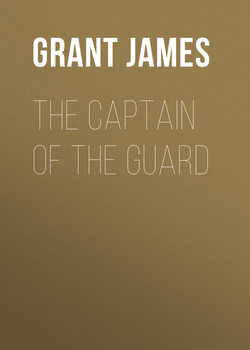Читать книгу The Captain of the Guard - Grant James - Страница 9
CHAPTER VIII
I LOVE YOU
ОглавлениеI do not seek to quench your love's hot fire,
But qualify the fire's extreme rage,
Lest it should burn above the bounds of reason.
Shakespeare.
By the time when the garrulous old abbot had concluded his story the night was far advanced. The lights in the sconces and the fire had burned low, while the ladies looked pale and weary, and all who were not in immediate attendance upon the earl and countess of Douglas, prepared to seek their habitations in the city.
As these were paying their several adieux, Sir Patrick Gray came close to Murielle, and tenderly pressed her hand; but she gazed upon him with a sad and foreboding expression.
"Courage, Murielle, courage!" he whispered; "with strength and bravery on my side, with equal love and goodness on yours, our mutual stedfast faith and hope, we may yet overcome everything."
"Even the prejudices of my sister?"
"Ay, even the hatred, for such it is, of your sister, – the sombre pride and wrath of that fierce boy her husband."
"Oh, that it may be so!" she whispered, breathlessly; "but there are times when I have strange fears."
"Murielle, tide what may, remember that while life lasts I love you!"
All they could desire to say was comprised in these three very little words. Little they are, yet how much do they contain! The essence of all the love speeches, love-letters, and sonnets that have been written since the invention of letters, – since Cadmus brought his alphabet from Phœnicia into Greece. When two lovers have said these words they can only repeat them.
"I love you!" They have nothing more to say. The countess, ever watchful, had observed this brief conference, and though anger sparkled in her deep, dark eyes, she veiled it under a bright smile, and, closing her fan, gave her pretty hand to Gray, who bowed and kissed it, though the petulant earl coldly turned from him, saying: —
"Sir Patrick, fare you well until to-morrow."
"Until to-morrow," added the earl of Abercorn, with one of the strange smiles which curled his thin white lips at times, as Gray and MacLellan retired together, after gaining golden opinions in the ranks of the enemy, – to wit, the ladies of the hostile faction.
The young Captain of the Guard had the art of pleasing all – the ladies especially; and at such a time, when family feuds, pride, and hatred, were rampant passions, the art was one of no small value, though in Scotland few cared to cultivate it, for chivalry was already on the decline.
In society such as that in which we introduce him to the reader, he contrived to be, or appeared to be, friendly with those who were most averse to each other in politics and ambition; yet he neither condescended to flatter nor dissemble, but often was prudently silent, where to differ would have brought swords from their scabbards; and he assented with grace and pleasure wherever he could do so with honour.
By this system, acquired amid the dark intrigues of a turbulent court, rather than in the camp, Sir Patrick Gray was a general favourite, especially of the young king, who was then, as before-mentioned, in his eleventh year, and whose preceptor he became, in all military exercises and the sports of the field. Gray had natural tact, a knowledge of the then limited world, and the great art of occasionally conquering himself.
Murielle was the stake he played for, and he never lost sight of her.
The moon had waned, and not a star was visible in the dark November sky, as he and MacLellan proceeded through the gloomy city towards the fortress.
"A moonless night, but a fine one," said Gray, wrapping his velvet cloak about him.
"For shooting bats or owls," added MacLellan, as he stumbled over the rough and unpaved street. "Ay, and a night to try men's mettle if there be witches abroad."
"Soho!" said Gray, gaily; "we have left the most perilous witches behind us, with old Abbot John, of Tongland; but assuredly one is safer in a gaberlunzie's canvas gaberdine than a velvet pourpoint to-night, when so many Douglas troopers and Annandale thieves in Johnstone grey are abroad; and the sky is so dark that the devil, were he here, could not see his own tail behind him."
Unmolested, however, they reached the castle, where the portcullis was down and all the gates secured; and where the garrison, which was almost entirely composed of the lord chancellor's vassals, kept watch and ward as warily as if a foreign army, and not the Douglases, had been in the sleeping city below.
As they entered a man passed out: he was muffled in a cloak, with an iron salade on his head – a species of helmet, which effectually concealed the face, but had a horizontal slit for the eyes.
Recognizing the voice of Gray, he rubbed his thin hands together, and smiled maliciously; for this nocturnal rambler was James Achanna, who had just been depositing the four coffins in the vault of David's Tower, and who seemed still to see before him, as the unconscious lover passed gaily into the fortress, a gilt plate inscribed: "Murielle Douglas, qui obit 23 Novembris, A.D. 1440."
